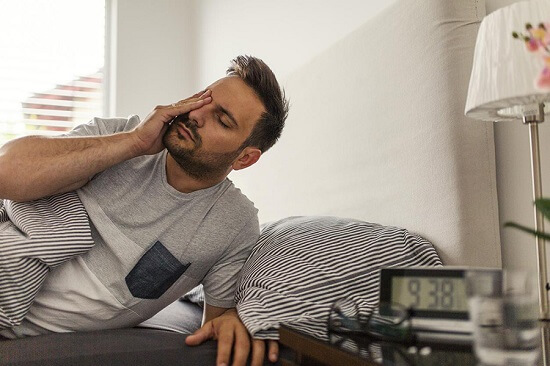Sleep and health are closely linked and improving your night's sleep is essential for optimal physical and mental health.
Poor quality or inadequate sleep can have a negative impact on both.
Getting enough quality sleep can help reduce stress, boost immunity, regulate hormones, and help with concentration and focus during the day.
To improve your night's sleep, it's important to start by establishing a regular sleep routine that works for you.
This could include spending some relaxing time before bed, such as reading, taking a hot bath or shower, meditating, writing in a journal, or listening to music.
Avoiding screens before bed can also be beneficial in helping you relax and prepare for sleep; instead, opt for activities that create a more relaxing environment before bed.
Additionally, reducing your caffeine intake later in the day will help prevent your body from becoming overstimulated at night as it tries to rest and relax.
Aiming to get 7-8 hours of uninterrupted sleep each night will help ensure that you wake up rested and refreshed each morning, ready to take on the day!
How Much Sleep?
Consistency: Developing a consistent sleep-wake cycle is one of the best ways to improve your night's sleep.
Go to bed and wake up at the same time every day, even on weekends and days off.
This helps regulate your body's internal clock and optimize the quality of your sleep.
Environment: Your bedroom should be cool, dark, quiet, and comfortable.
If a lot of light or noise is coming from outside, consider putting up blackout curtains or using a sound machine to mask disturbing sounds.
Make sure all electronic devices are turned off before bed so they don't disturb your rest.
Try not to work or watch TV in bed - this can create negative associations with being awake instead of sleeping.
Routine: Establishing a regular bedtime routine can help you relax and prepare for bed each night.
It can include activities like taking a hot bath, listening to relaxing music, reading a book or magazine, meditating or practicing yoga poses, writing in a journal – any activity that gets you into relaxation mode before going to bed.
Reduce Stimulation to improve night's sleep
One way to reduce stimulation before bed is to avoid screens.
Watching television, surfing social media or playing video games can stimulate the brain and make it difficult to sleep.
Instead, focus on calming activities like reading a book or magazine.
Paying attention to the words rather than the visuals can be comforting and help your mind relax. Another way to reduce stimulation is to avoid caffeine and alcohol several hours before going to bed.
Caffeine is known for its stimulant effects, so drinking coffee or soda too close to bedtime can prevent you from sleeping well.
Alcohol also interferes with sleep patterns because it tends to increase wakefulness during the second half of the night.
Finally, taking a warm bath before bed can help create a calm environment conducive to falling asleep more quickly and easily.
exercise early
Exercising early in the morning can be a great way to improve your night's sleep.
Morning exercise can help regulate your body's internal clock and promote better quality sleep.
Exercise releases endorphins that have been linked to improved mood and energy levels throughout the day.
It also helps reduce stress, which is another factor that can affect sleep at night.
Additionally, exercising in the morning will help you start your day with more energy, allowing for more productive activities throughout the day.
Making exercise part of your daily routine will also help you form healthy habits that spill over into other important aspects of life like diet, hydration, and self-care.
As an added bonus, exercising in the morning can provide you with more time to wind down before bed, so you can fall asleep more easily when bedtime comes around.
Create a Comfortable Environment for a Better Night's Sleep
Creating a comfortable environment is key to improving your night's sleep.
Start by making sure the room temperature is right for you; too much heat or cold can make it difficult to relax and fall asleep.
A fan or air conditioner can help regulate the temperature, while adding an extra blanket or taking one out can also help find the perfect balance.
Keeping the room dark is also important; try blackout curtains, eye masks and unplug any electronic devices that emit light, as this can disrupt your sleep cycle.
Finally, create a calming atmosphere in your bedroom; use aromatherapy to relieve anxiety and add relaxing music to calm down before bed.
Conclusion: Improving sleep quality
Small changes in habits and lifestyle can affect the quality of sleep.
Establishing a regular sleep routine is one of the most effective ways to improve your night's sleep.
Finally, talking to your doctor about any underlying conditions, such as insomnia or chronic pain, can be helpful in finding solutions that work best for you.
They may be able to suggest certain medications or therapies that can address specific issues related to poor sleep quality so that you can get more restful nights of sleep on a regular basis.

